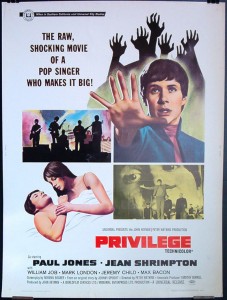“We must, of necessity, subdue the critical elements in the country’s youth.”
|

Synopsis:
In a dystopic “near-future”, Britain’s coalition government uses rock star Steve Shorter (Paul Jones) to manipulate public opinion.
|
|
Genres, Themes, Actors, and Directors:
- Dystopia
- Media Spectacle
- Musical
- Naive Public
- Peter Watkins Films
- Propaganda
- Rise and Fall
- Rock ‘n Roll
Response to Peary’s Review:
As Peary notes, this somewhat dated Big Brother flick is mostly notable as a glimpse at “controversial” films of the late 1960s. While filmed in quasi-documentary style, the movie lacks the deliberate humor of recent mockumentaries; it’s more akin to the deadpan political satire of Tim Robbins’s Bob Roberts (1992) or Warren Beatty’s Bulworth (1998). The film’s unusual story arc doesn’t chronicle the typical “rise and fall” of a superstar, but rather begins at the tipping point of Shorter’s fame. Thus, we never see any of the arrogance or cockiness that this nation-wide phenomenon must surely have possessed at some point; we are simply witness to his growing discomfort and despair.

Storyline aside, Privilege is primarily energized whenever Paul Jones hits the stage. He has a truly haunting voice, and the ballads he sings aren’t half-bad. He’s a surprisingly decent actor, too.
Redeeming Qualities and Moments:
- Effectively Big Brother-ish sets

- The opening “Theatre of Cruelty” musical act

- Peter Suschitsky’s cinematography

- An excellent rock soundtrack
Must See?
Yes. It holds a place in film history, and thus will most likely be of interest to true film fanatics.
Categories
Links:
|
One thought on “Privilege (1967)”
First viewing. Yes, a must, at least once. An interesting curio in itself, it seems to have been influential in ways of interest to film (and rock music) fanatics. It does come across as a kind of flip-side Orwellian response to the innocent sprightliness of 1964’s “A Hard Day’s Night’. In “Privilege’ (false privilege for the ex-con lead who only listens to his own music and passes the time watching kids’ programs), the pop star’s fans are not just maniacally devoted, they–like the star–are pawns of the government, the church, society in general, all for the purpose of peaceful, “fruitful conformity”. As the main manager of Paul Jones’ character explains: “[People] are stunted little creatures with primitive emotions that are, in themselves, dangerous. They’ve got to be harnessed. Guided. We’ve seen this happen over and over again for an evil purpose.” True, malevolence is not part of this scenario (the film is as droll as it is biting); still, fervor toward nationalist unity will lead to loss of the self (a reality like that of similarly isolated Japan). “Privilege” is slightly dated but its view of pop artists as manipulated and/or manipulators has lost none of its power. Appropriately for a “vessel”, Jones is something of a cipher but effective–as is Jean Shrimpton (very surprising performance by a supermodel!).
Noted:
a) film fanatics may sense an Altman-like tone (he was breaking into features around this time) as well as the Ken Russell-like excess in the Christian Crusade Week rally (echoed in Russell’s “Tommy”–which, in general, seems a direct result of “Privilege’)
b) along with “Bob Roberts’, other films that seem to owe something to the tone of”Privilege’ include “This is Spinal Tap’, “The Rutles: All You Need is Cash’, perhaps others
c) DOP for “Privilege’ was Peter Suschitsky–noteworthy since a huge rally poster of Paul Jones highlights his lips; Suschitsky was later DOP for “Rocky Horror’, which opens with that iconic mouth
d) rock music lovers will realize that Patti Smith covered “Set Me Free’ (better, with significant lyric changes, and use of the 23rd Psalm–an echo of the Christian music used as propaganda in “Privilege’); the upbeat version of “Onward, Christian Soldiers’ bears some resemblance to Ani DiFranco’s cover of “Amazing Grace’